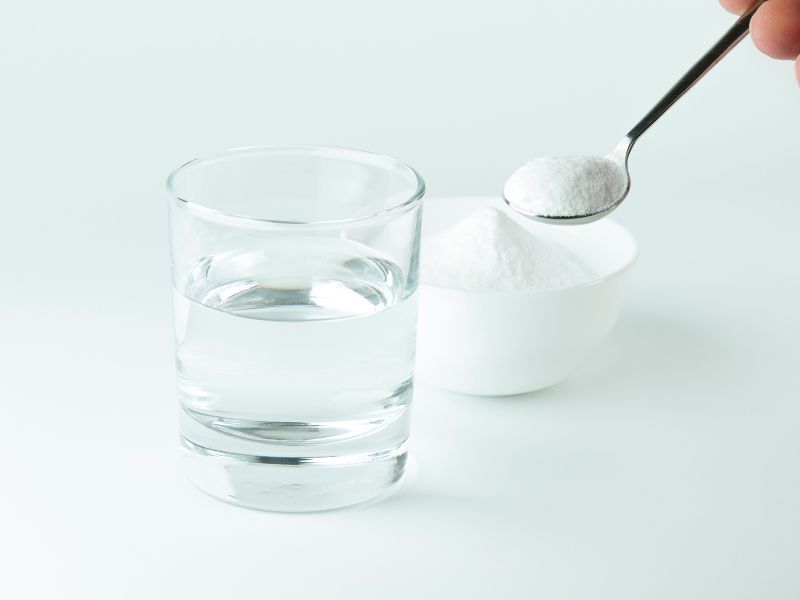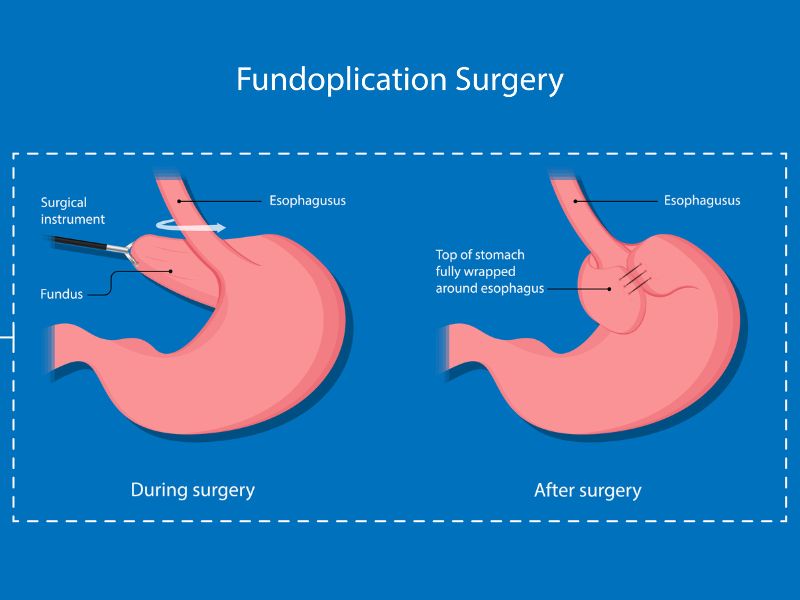You can cure GERD permanently by making simple changes to your daily habits, like adjusting what you eat or maintaining a healthy weight. Some other people may need medication or surgery, but lasting relief is possible.
GERD is more than occasional heartburn—it often causes burning in the chest, a sour taste, or trouble swallowing. If untreated, it can lead to serious issues like inflammation, ulcers, or even an increased cancer risk. Penn Medicine Becker ENT & Allergy has the specialists to help you overcome GERD.

Why is Treating GERD Important?
GERD, or gastroesophageal reflux disease, is a long-term condition where stomach acid frequently flows into the esophagus. This happens when the lower esophageal sphincter (LES), a muscle between the stomach and esophagus, doesn’t close properly. The acid irritates the esophagus lining, causing inflammation and discomfort.
GERD is a more severe and persistent form of acid reflux, and if left untreated, can lead to serious complications such as esophageal ulcers, strictures, and even an increased risk of esophageal cancer.
Symptoms of Acid Reflux
It is essential to consult an ENT specialist if you experience these symptoms frequently, as they could indicate GERD or another underlying condition.
GERD Treatments at Home
There are several treatment options available for managing GERD and achieving lasting relief from acid reflux symptoms. These include lifestyle changes, medications, alternative remedies, and surgical interventions in severe cases.

Diet Changes for GERD Relief
Making certain dietary modifications can significantly improve GERD symptoms. Some recommended changes include:
- Avoid trigger foods like spicy dishes, citrus fruits, tomatoes, chocolate, and fatty or fried foods.
- Limit caffeine and alcohol intake, both of which can relax the lower esophageal sphincter.
- Eat smaller, more frequent meals to reduce stomach pressure.
- Stay hydrated, but avoid drinking large amounts of liquid with meals.
- Avoid eating late at night, ideally finishing meals at least 2–3 hours before bedtime.

Lifestyle Changes for GERD Relief
Making a few daily adjustments can help manage GERD symptoms and reduce the need for long-term medication. Here are some effective lifestyle changes for GERD relief:
- Avoid lying down after eating; stay upright for at least 2–3 hours.
- Raise the head of your bed by 6–8 inches to prevent nighttime acid reflux.
- Maintain a healthy weight to ease pressure on the stomach.
- Quit smoking, as it weakens the muscle that controls reflux.
- Wear loose-fitting clothing to avoid putting extra pressure on your abdomen.
- Practice stress management techniques like deep breathing or light exercise to reduce reflux triggers.
Research shows that up to 40% of GERD patients experience significant symptom improvement through lifestyle changes alone, without needing long-term medications .

Medications for Treating Acid Reflux
There are several medications available for treating GERD and relieving acid reflux symptoms. Over-the-counter antacids can provide quick relief by neutralizing stomach acid. H2 blockers, such as ranitidine and famotidine, reduce acid production and can be taken before meals to prevent acid reflux.
Proton pump inhibitors (PPIs), like omeprazole and lansoprazole, are the most potent acid reducers and are often prescribed for long-term GERD management. Always consult your healthcare provider before starting any medication to ensure it is appropriate for your condition.

Alternative Remedies for Acid Reflux
Some alternative remedies may help alleviate GERD symptoms. Herbal remedies like slippery elm, chamomile, and licorice root can soothe the esophagus and reduce inflammation. Probiotics can help balance gut bacteria and improve digestion, potentially reducing acid reflux symptoms.
Acupuncture and relaxation techniques such as deep breathing exercises and meditation may also help manage stress, which can contribute to GERD. It is essential to discuss these options with your healthcare provider to ensure they are safe and effective for your specific needs.

How to Treat GERD Naturally
Some natural home remedies may provide temporary relief from acid reflux symptoms. Drinking a mixture of baking soda and water can help neutralize stomach acid and alleviate heartburn. Aloe vera juice may soothe the esophagus and reduce inflammation. Chewing gum can stimulate saliva production, helping to neutralize acid and clear it from the esophagus.
While these remedies may provide temporary relief, it is essential to address the root cause of GERD and work with your healthcare provider to develop a comprehensive treatment plan.
Do Not Let GERD Control Your Days
Contact Penn Medicine Becker ENT & Allergy, where our expert team is ready to provide personalized care and effective solutions.
Can Surgery Permanently Cure GERD?
Fundoplication Surgery for GERD

In severe cases of GERD that do not respond to lifestyle changes or medications, surgery may be recommended. The most common surgical procedure for GERD is called fundoplication, which involves wrapping the top of the stomach around the lower esophagus to strengthen the LES and prevent acid reflux.
This procedure can provide long-lasting relief from GERD symptoms for many patients. In fact, studies show that over 85% of patients who undergo laparoscopic fundoplication remain symptom-free five years after surgery, making it a strong option for those seeking lasting results.
However, surgery should only be considered after exhausting other treatment options and discussing the risks and benefits with your healthcare provider.
Tips for Preventing Acid Reflux
There are several strategies you can implement to prevent acid reflux and reduce the risk of developing GERD.
Avoid Trigger Foods and Beverages
Identify and avoid foods and beverages that trigger your acid reflux symptoms. Common culprits include spicy, fatty, or acidic foods, as well as caffeinated and carbonated beverages. Keep a food diary to help you pinpoint your specific triggers and eliminate them from your diet.
Dietary changes: Eat Smaller Meals
Eating smaller, more frequent meals can help prevent acid reflux by reducing the pressure on the LES. Avoid overeating and try to eat at least two to three hours before lying down or going to bed.
Don’t Lie Down Immediately After Eating
Gravity plays a crucial role in keeping stomach acid where it belongs. Lying down too soon after eating can cause acid to flow back into the esophagus. Wait at least two to three hours after eating before lying down or going to bed to give your stomach time to empty and reduce the risk of acid reflux.
Elevate the Head of Your Bed
Elevating the head of your bed can help prevent acid reflux by using gravity to keep stomach acid from flowing back into the esophagus while you sleep. You can achieve this by placing a wedge pillow or foam block under the mattress or by using bed risers to raise the head of the bed by 6 to 8 inches. This simple adjustment can make a significant difference in reducing nighttime GERD symptoms.
Quit Smoking
Smoking can weaken the LES and increase the risk of acid reflux. Quitting smoking is not only beneficial for your overall health, but it can also help reduce GERD symptoms. There are various methods to help you quit, such as nicotine replacement therapy, medications, and support groups. Consult your healthcare provider for guidance on the best approach for you to quit smoking.
Wear Loose-Fitting Clothing
Tight clothing, especially around the waist, can put pressure on the stomach and contribute to acid reflux. Opt for loose-fitting clothing that does not constrict your abdomen, allowing your digestive system to function properly without undue pressure.
Stress Levels: The Connection Between Stress and GERD
Stress is also believed to play a role in GERD, as it can cause the muscles in the esophagus to tighten, making it more difficult for the LES to function properly. It can lead to poor eating habits, increased alcohol consumption, and smoking, all of which can exacerbate GERD symptoms.
Incorporate stress-relieving techniques into your daily routine, such as deep breathing exercises, meditation, yoga, or engaging in hobbies that bring you joy and relaxation.
Why Choose Penn Medicine Becker ENT & Allergy for GERD Diagnosis and Long-Term Care
If you’re living with acid reflux, you may wonder, “Is GERD forever?” At Penn Medicine Becker ENT & Allergy, we provide clear answers and personalized care for patients managing both short-term symptoms and long-term GERD concerns.
Why patients trust us:
- Expert Diagnosis: We detect both typical and silent GERD symptoms early and accurately.
- Personalized Treatment Plans: Care that’s tailored to your lifestyle, symptoms, and long-term goals.
- Coordinated Care: Seamless collaboration with gastroenterology specialists when needed.
Find relief and long-term support with a team that understands GERD from every angle.
Make an appointment with a specialist in NJ & PA!
If you’re suffering from GERD and want to find permanent relief, contact the experts at Penn Medicine Becker ENT & Allergy. Our team of experienced professionals can help you create a personalized treatment plan, so you can finally put an end to your acid reflux for good. Schedule an appointment today with us for the best possible care and a tailored solution that works for you!

